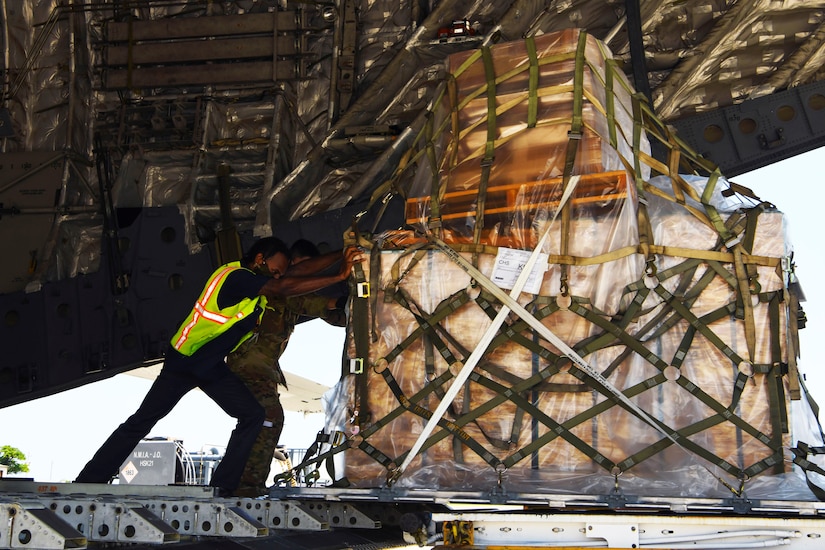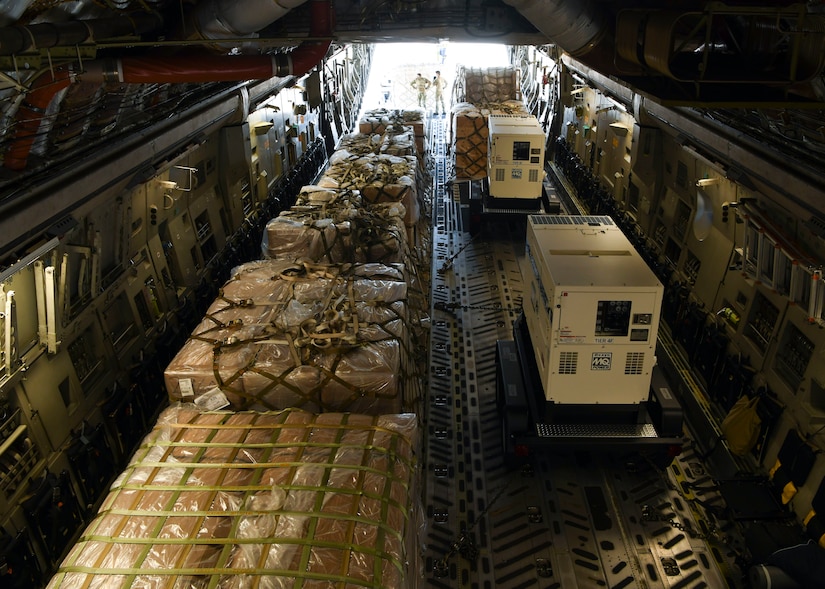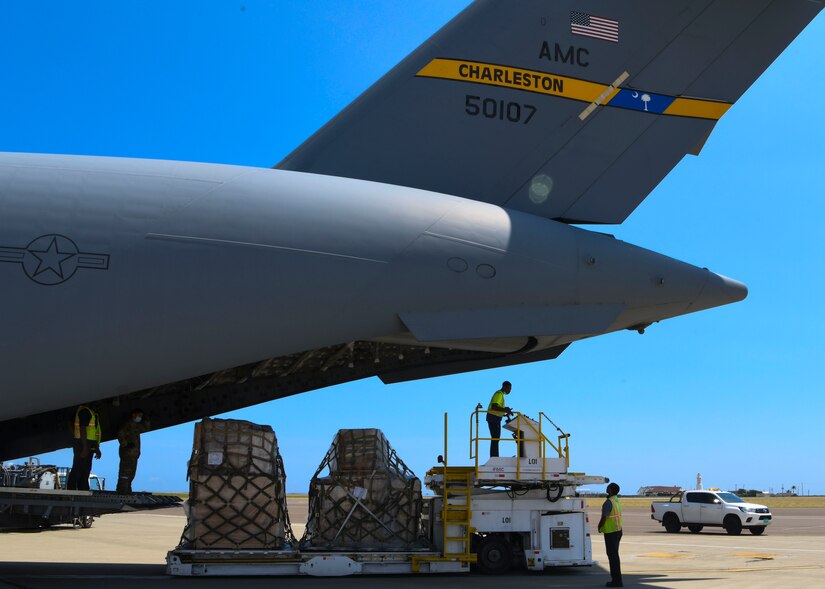Sept. 25, 2020
A U.S. Air Force C-17 Globemaster III aircraft transported a large mobile field hospital from Joint Base Charleston, South Carolina, to Kingston, Jamaica, to be donated to health care providers and used to support the Caribbean nation's ongoing response to the COVID-19 pandemic, Sept. 19, 2020.
The donation, made on behalf of the American people, cost $753,000 and was purchased as part of U.S. Southern Command's ongoing assistance to nations responding to the global pandemic in the Caribbean, Central America and South America and funded by the command's humanitarian assistance program, or HAP.
 |
| Add caption |
The Southcom-funded hospital can house up to 70 patient beds and will support health and public-safety professionals caring for patients, saving lives and mitigating suffering. The modular hospital is equipped to operate autonomously and includes a HEPA and ultraviolet-light air-scrubber system, two diesel generators and eight air conditioning units. Medical teams using the hospital can configure it to isolate patients and conduct surgery, if needed.
The field hospital was set up Sept. 21-23 and delivered ready for the Jamaican government to staff, equip and operate. A team of civilian trainers instructed Jamaican medical and support teams chosen to run the mobile hospital on its assembly, set up, use, disassembly, transportation and storage.
Ambassador Donald Tapia, U.S. ambassador to Jamaica, accompanied by Navy Adm. Craig Faller, commander of Southcom, officially handed over the field hospital Sept. 24, at a ceremony at the National Chest Hospital in Kingston. Dr. Horace Chang, Jamaica's deputy prime minister and minister of national security, and Dr. Christopher Tufton, Jamaica's minister of health and wellness, were also in attendance.
In addition to the field hospital, Southcom has also funded the donation of hand-held thermometers and patient beds, at a cost of approximately $86,000. Overall, the U.S. government has provided Jamaica with $2 million in foreign assistance funding to support the country's ongoing COVID-19 response, and efforts to prevent and control infectious diseases.

The command has also delivered mobile field hospitals to Costa Rica and the Dominican Republic.
In total, Southcom will donate 24 field hospitals to 11 countries.
Southcom's support to COVID-19 response and mitigation efforts began in late March, as the first signs of COVID-19 infections emerged and nations requested assistance from the U.S. government.
The first phase of Southcom's assistance focused on supporting the countries' immediate response to the pandemic by providing much-needed resources, procured locally, to first responders and health care providers on the front lines. During that initial phase, more than 80 HAP projects donated personal protective equipment, consisting of N-95 masks, gloves, face shields, protective coveralls and disposable aprons. Medical supplies, medical equipment and COVID-19 testing supplies were also donated during the initial phase.
The field hospitals are among the donations funded in the second phase of Southcom's assistance to the region, which is focused on supporting the region's long-term preparedness and prevention efforts.
To date, the command has funded more than 320 HAP projects, purchasing more than $17 million in supplies, equipment and other vital resources to support the COVID-19 response and mitigation efforts in 28 nations. In total, the U.S. government has provided more than $135 million in COVID-19 response assistance to the region.
HAP helps partner nations build their disaster readiness, response and mitigation capabilities. The program funds infrastructure, equipment and training to help nations prepare before disasters and crises strike, but also supports countries who request assistance from the U.S. government when they experience health- and weather-related emergencies.

COVID-19 assistance projects are funded under HAP to support requests from partner nations for supplies and equipment needed to respond to the virus outbreak, treat infected patients and prevent additional exposures. The U.S. State Department and U.S. Agency for International Development review the projects and concur with their proposed assistance before they are approved. All COVID-19 assistance items donated under the program were purchased from host-nation or regional suppliers with no impact on the Defense Department's force health protection supply chain.
To date, the countries that have been assisted under HAP include Antigua and Barbuda, Argentina, Barbados, Bolivia, Brazil, Chile, Colombia, Costa Rica, Curacao, Dominica, the Dominican Republic, Ecuador, El Salvador, Grenada, Guatemala, Guyana, Haiti, Honduras, Jamaica, Panama, Paraguay, Peru, St. Kitts and Nevis, St. Lucia, St. Vincent and the Grenadines, Suriname, Trinidad and Tobago and Uruguay.
(U.S. Southern Command Courtesy Story).








No comments:
Post a Comment